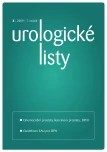Therapeutic Options for Advanced Prostate Cancer. Management of locally advanced and androgen dependent prostate cancer
Authors:
L. Klotz; K. Pienta
Authors‘ workplace:
Division of Urology Sunnybrook Health Sciences Centre, Toronto
Published in:
Urol List 2009; 7(3): 15-23
Overview
The author in his article presents an overview of therapeutic options for the treatment of locally advanced prostate cancer, which represents a heterogeneous group of tumors. In most patients is usually indicated combination treatment with androgen deprivation playing an important role. It is important and not easy to estimate what form will be the most suitable for particular patient, concerning alternative of combination treatment and its timing. Very important role in decision can be contributed to PSA kinetics. Based on previous and current clinical studies, the author tries to answer question which form of hormonal deprivation is appropriate in which patient. Last but not least he deals with the issue how to identify, treat and follow up androgen independent tumors.
Key words:
locally advanced prostate cancer, androgen dependency, timing of hormonal treatment, alternatives of androgen deprivation
Sources
1. Scher HI, Mazumdar M, Kelly WK. Clinical trials in relapsed prostate cancer: defining the target. J. Natl. Cancer Inst. 1996; 88 (22): 1623–1634.
2. Small EJ, Vogelzang NJ. Second-line hormonal therapy for advanced prostate cancer: a shifting paradigm. J. Clin. Oncol. 1997; 15 (1):382–388.
3. Scher HI, Liebertz C, Kelly WK et al. Bicalutamide for advanced prostate cancedr:the natural versus treated histoy of disease. J. Clin. Oncol. 1997; 15 (81): 2928–2938.
4. Eisenberger MA, Blumenstein BA, Crawford ED et a1. Bilateral orchiectomy with or without flutamide for metastatic prostate cancer. N. Eng1. J. Med. 1998; 339 : 1306–1342.
5. Prostate Cancer Trialists’ Collaborative Group. Maximum androgen blockade in advanced prostate cancer: an overview of the randomized trials. Lancet 2000; 355 (9214): 1491–1498.
6. Klotz LH, Newman T. Total androgen blockade for metastatic prostate cancer: history and analysis of the PCTCG overview. Can J Uroll 1996; 3 (Suppl 1): 102–105.
7. Agency for Health Care Policy and Research (AHCPR) 2000. Evidence-based Proactive Center of the Blue Cross and Blue Shield Association. Relative effectiveness and cost-effectiveness of methods of androgen suppression in the treatment for advanced prostatic cancer. http://www.ahcpr.gov/
8. Klotz L. Combined androgen blockade in prostate cancer: meta-analyses and associated issues. BJU Int 2001; 87 (9): 806–813.
9. The Medical Research council Prostate Cancer Working Party Investigator’s Group. Immediate versus deferred treatment for advanced prostate cancer: initial results of the medical research council. Brit J. Urol. 1997; 79 (2): 235–246.
10. Messing EM et al. Immediate hormonal therapy compared with observation after radical prostatectomy and pelvic lymphadenectomy in men with node-positive prostate cancer. N. Engl. J. Med. 1999; 341 (24): 1781–1788.
11. Lundgren R, Nordle O, Josefsson K et al. Immediate estrogen or estramustine phosphate therapy versus deferred endocrine treatment in nonmetastatic prostate cancer: a randomized multicenter study with 15 years of follow-up. J. Uro1. 1995; 153 (5): 1580–1586.
12. Braga-Basaria M, Dobs AS, Muller DC et al. Metabolic syndrome in men with prostate cancer undergoing long-term androgen-deprivation therapy. J Clin Oncol. 2006; 24 (24): 3979–3983.
13. Moule J. Early vs delayed ADT for PSA recurrence post RP: PSA DT predicts for benefit of early therapy. J Urol. 2004; 171 (3): 1141–1147.
14. Klotz L, Schellhammer P, Carroll K. A re-assessment of the role of combined androgen blockade for advanced prostate cancer. BJU Int. 2004; 93 (9): 1177–1182.
15. Usami M, Akaza H et al. Bicalutamide combination vs LHRH alone for advanced prostate cancer. Prostate Ca and Prost Dis 2007 : 1–8 Update presented at the European Multdisciplinary Uro Oncology Conference, Barcelona, Nov 2007.
16. Partin AW, Walsh PC. Re: The use of prostate specific antigen, clinical stage and Gleason score to predict pathological stage in men with localized prostate cancer. J Urol. 1994; 152 (1): 172–173.
17. Kane CJ, Amling CL, Johnstone PA et al. Limited value of bone scintigraphy and computed tomography in assessing biochemical failure after radical prostatectomy. Urology. 2003; 61 (3): 607–611.
18. Cher ML, Bianco FJ Jr, Lam JS et al. Limited role of radionucleotide bone scintigraphy in patients with prostate specific antigen elevations after radical prostatectomy. J Urol. 1998; 160 (4): 1387–1391.
19. Okotie OT, Aronson WJ, Wieder JA et al. Predictors of metastatic disease in men with biochemical failure following radical prostatectomy. J Urol. 2004; 171 (6 Pt 1): 2260–2264.
20. Stephenson AJ, Shariat SF, Zelefsky MJ et al. Salvage radiotherapy for recurrent prostate cancer after radical prostatectomy. JAMA. 2004; 291 (11): 1325–1332.
21. Freedland SJ, Humphreys EB, Mangold LA et al. Risk of prostate cancer-specific mortality following biochemical recurrence after radical prostatectomy. JAMA. 2005; 294 (4): 433–439.
22. Attard G, Belldegrun AS, de Bono JS. Selective blockade of androgenic steroid synthesis by novel lyase inhibitors as a therapeutic strategy for treating metastatic prostate cancer. BJU Int. 2005; 96 (9): 1241–1246.
Labels
Paediatric urologist UrologyArticle was published in
Urological Journal

2009 Issue 3
-
All articles in this issue
- Role of radical prostatectomy in the treatment of prostate cancer confined to prostate gland. Reality and myth, truth and fiction about robotic assisted radical prostatectomy
- Therapeutic Options for Advanced Prostate Cancer. Management of locally advanced and androgen dependent prostate cancer
- SALVAGE CRYOSURGERY
- STAGING AND GRADING OF PATIENTS WITH LOWER URINARY TRACT SYMPTOMS (LUTS): A PATHOPHYSIOLOGICAL CLASSIFICATION FOR FURTHER MANAGEMENT
- THE HOLMIUM LASER IN THE TREATMENT OF BENIGN PROSTATIC ENLARGEMENT
- GREENLIGHT PVP. MAYO CLINIC APPROACH, SURGICAL TECHNIQUE, AND OUTCOMES
- Urological Journal
- Journal archive
- Current issue
- About the journal
Most read in this issue
- THE HOLMIUM LASER IN THE TREATMENT OF BENIGN PROSTATIC ENLARGEMENT
- GREENLIGHT PVP. MAYO CLINIC APPROACH, SURGICAL TECHNIQUE, AND OUTCOMES
- Therapeutic Options for Advanced Prostate Cancer. Management of locally advanced and androgen dependent prostate cancer
- Role of radical prostatectomy in the treatment of prostate cancer confined to prostate gland. Reality and myth, truth and fiction about robotic assisted radical prostatectomy
